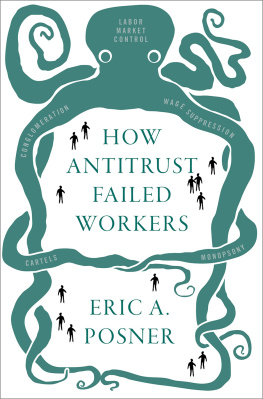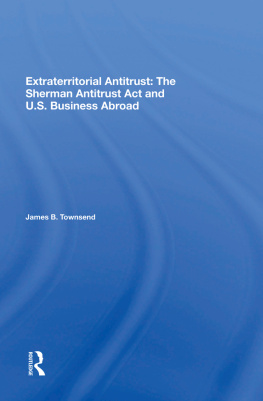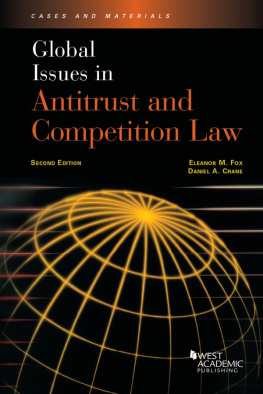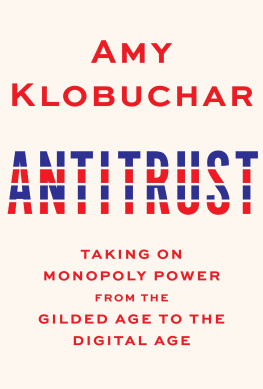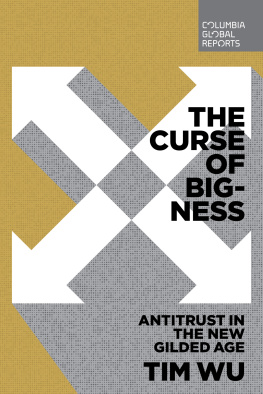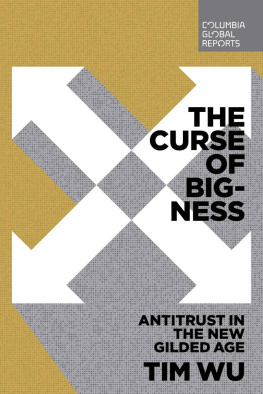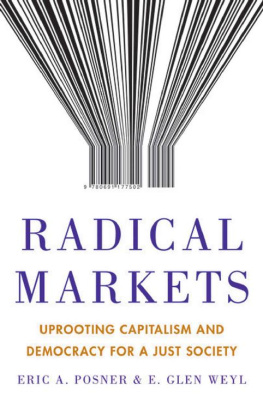HOW ANTITRUST FAILED WORKERS


Oxford University Press is a department of the University of Oxford. It furthers the Universitys objective of excellence in research, scholarship, and education by publishing worldwide. Oxford is a registered trade mark of Oxford University Press in the UK and certain other countries.
Published in the United States of America by Oxford University Press
198 Madison Avenue, New York, NY 10016, United States of America.
Oxford University Press 2021
All rights reserved. No part of this publication may be reproduced, stored in a retrieval system, or transmitted, in any form or by any means, without the prior permission in writing of Oxford University Press, or as expressly permitted by law, by license, or under terms agreed with the appropriate reproduction rights organization. Inquiries concerning reproduction outside the scope of the above should be sent to the Rights Department, Oxford University Press, at the address above.
You must not circulate this work in any other form and you must impose this same condition on any acquirer.
Library of Congress Cataloging-in-Publication Data
Names: Posner, Eric A., 1965- author.
Title: How antitrust failed workers / Eric A. Posner.
Description: New York, NY : Oxford University Press, [2021] |
Includes index.
Identifiers: LCCN 2021017327 | ISBN 9780197507629 (hardback) |
ISBN 9780197507643 (epub) | ISBN 9780197507650
Subjects: LCSH: Antitrust lawEconomic aspectsUnited States. |
Labor economicsUnited States.
Classification: LCC KF1652 .P67 2021 | DDC 343.7307/21dc23
LC record available at https://lccn.loc.gov/2021017327
DOI: 10.1093/oso/9780197507629.001.0001
Contents

The claim that labor market power raises inequality and reduces growth mirrors another claim that has received attention latelythat the product market power of firms has contributed to rising inequality and faltering growth. A product market is a collection of products defined by frequent consumer substitution. When a small number of sellers or one seller of these products exist, we say that each seller has product market power, which enables it to charge a price higher than marginal cost, or the price that would prevail in a competitive market. When a small number of employers hire from a pool of workers of a certain skill level within the geographic area in which workers commute, the employers have labor market power.
One major source of market power in both types of markets is thus concentration, where only a few firms operate in a given market. Imagine, for example, a small town with only a few gas stations. Each gas station sets the price of gas to compete with the prices of the other gas stations. When a gas station lowers its price, it may obtain greater market share from the other gas stationswhich increases profitsbut it also receives less revenue per sale. If only a single gas station exists, it will maximize profits by charging a high (monopoly) price because the gains from buyers willing to pay the price exceed the lost revenue from buyers who stay away. If only a few gas stations exist, they might illegally enter a cartel in which they charge an above-market price and divide the profits, or they might informally coordinate, which is generally not illegal, though the social harm is the same. In contrast, if many gas stations compete, prices will be bargained down to the efficient levelthe marginal costresulting in low prices for consumers and high aggregate output of gasoline.
Labor market concentration creates monopsony (or, if more than one employer, oligopsony, but I use these terms interchangeably) where labor market power is exercised by the buyer rather than (as in the example of gas stations) the seller. Employers are buyers of labor who operate within a labor market. A labor market is a group of jobs (e.g., computer programmers, lawyers, or unskilled workers) within a geographic area where the holders of those jobs could with relative ease switch among the jobs. The geographic area is usually defined by the commuting distance of workers. A labor market is concentrated if only one or a few employers hire from this pool of workers. For example, imagine the gas stations employ specialist maintenance workers who monitor the gas-pumping equipment. If only a few gas stations exist in that area, and no other firms (e.g., oil refineries) hire from this pool of workers, then the labor market is concentrated, and the employers have market power in the labor market. To minimize labor costs, the employers will hold wages down below what the workers would be paid in a competitive labor markettheir marginal revenue product. Faced with these low wages, some people qualified to work will refuse to. But the employers gain more from wage savings than they lose in lost output because of the small workforce they employ.
Antitrust law does not distinguish monopoly and monopsony (including labor monopsony): firms that achieve monopolies or monopsonies through anticompetitive behavior violate antitrust law. But product market concentration has received a huge amount of attention by courts, researchers, and regulators, while labor market concentration has received hardly any attention at all.
This historic imbalance between what I will call product market antitrust and labor market antitrust has no basis in economic theory. From an economic standpoint, the dangers to public welfare posed by product market power and labor market power are the same. As Adam Smith recognized, businesses gain in the same way by exploiting product market power and labor market powerenabling them to increase profits by raising prices (in the first case) or by lowering costs For that reason, businesses have the same incentive to obtain product market power and labor market power. Hence the needin both casesfor an antitrust regime to prevent businesses from obtaining product and labor market power except when there are offsetting social gains.
Why, then, the imbalance between product and labor market antitrust? There are a few possible answers. First, while economic theory treats product markets and labor markets similarly, legal theory has placed more emphasis on product markets. One possible reason for this is that since the 1960s, legal scholars have influentially argued that the amorphous norms of antitrust law that prevailed earlier in the 20th century should be replaced with a laser-like focus on consumer welfare. The resulting shift in focus naturally favored product market analysis because consumers primarily are injured by price increases caused by product market power. In contrast, primarily workers are injured by the exercise of labor market power. Of course, workers are consumers, and so workers benefited from the laws attention to product marketsbut not as much as they would have if the law had paid attention to labor markets as well.
Second, economists until recently assumed that labor markets were approximately competitive, and accordingly that labor market power was not an important social problem. Most people live in urban areas where numerous employers vie for workers. Workers can (and do) move around the country if jobs are scarce or pay is low where they live, putting an upper bound on the social cost of labor market power. A well-known textbook on industrial organization, published in 2005, claimed, Most labor economists believe there are few monopsonized labor markets in the United States. It is only in recent years that these assumptions have been thrown into doubt. Moreover, academic economics has long been divided into separate fields of industrial organization (IO) and labor economics. IO economists have focused on antitrust problems created by mergers and other corporate actions, while labor economists have focused on labor and employment law. Partly as a result, labor economists never developed the analytic tools relevant to forecasting the impact of increased labor market power that are analogous to or draw on the models IO economists use to analyze product market power.

